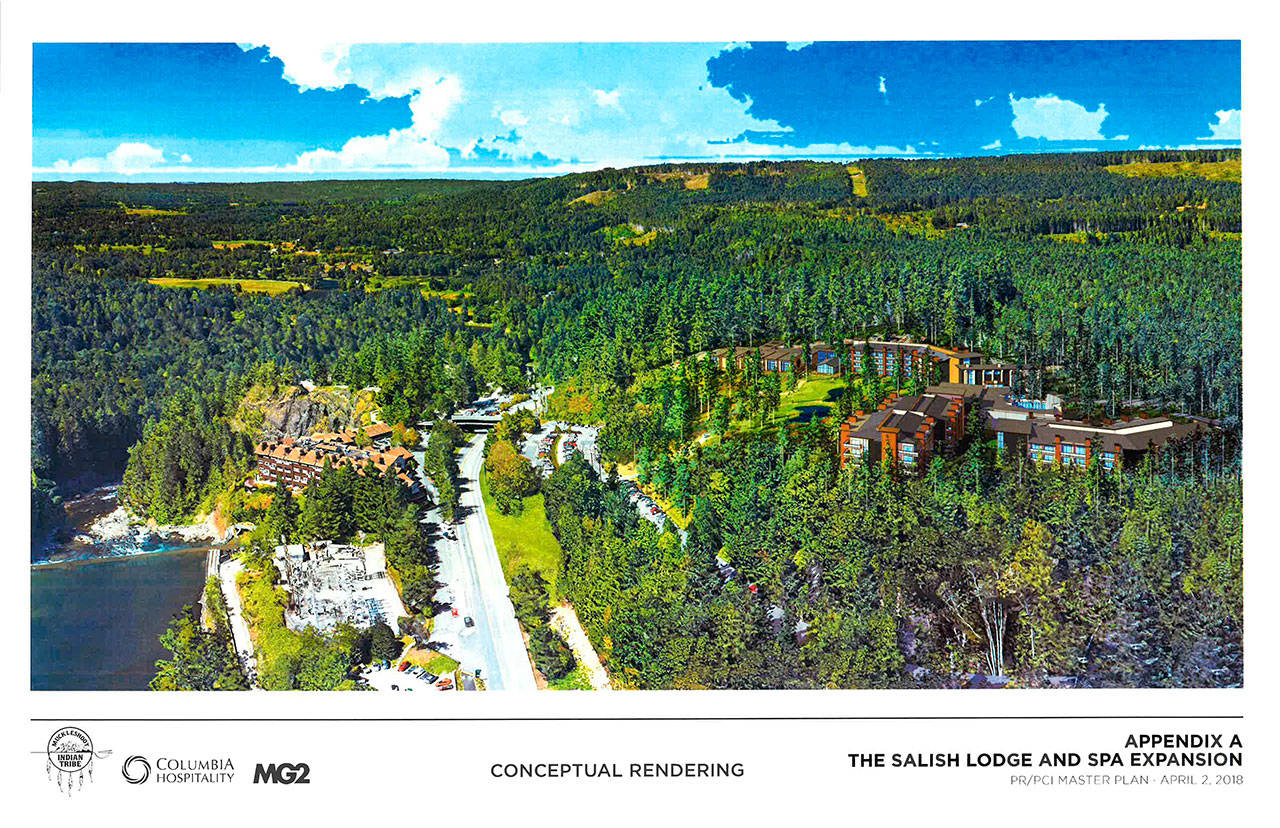On July 16, Snoqualmie’s Planning Commission held a public hearing on the Salish Expansion’s Master Plan that was submitted to the city in April.
The public hearing was led and moderated by Hearing Examiner Mark Scheibmeir, who explained that the Planning Commission had six aspects to consider while reviewing the plan and taking public comment: The suitability of the site for the proposed development, whether the requirements for the subdivision code have been met, if adverse environmental impacts have been mitigated, whether the development is in compliance with city statutes, what time limits are imposed on development, and if the development is consistent with the comprehensive plan.
Snoqualmie’s Community Development Director Mark Hofman gave an overview of the history of the project before the applicants, the Muckleshoot Indian Tribe, presented the Master Plan and explained several of the details behind the design.
The Salish expansion will be a multi-phase project that adds additional hotel and meeting space, with several additional amenities. Ron Mitchell, an architect from the firm MG2, said that the total size of the site is 49.6 acres, which includes all phases of development and the northern area intended for residential development. The hotel site, he said will be 21.4 acres and that the open space requirement for the development is 13.7 acres.
The hotel would consist of 182 rooms and flexible event space. With the project broken up into phases, Mitchell explained that the entryway and parking would be one of the first aspects to receive work. The current upper parking lot at the Salish Lodge would be replaced with open space and a pedestrian path. Another lower parking lot would be added so there would be no loss of parking for the city.
“We’ll have 90 plus hotel rooms in four stories in phase one, we have an event space in one story with meeting rooms and a ballroom,” he said. “Phase two will be the spa, and phase three will be the next 90 guest rooms.”
The Planning Commission then opened up the hearing for comments from the public. Michael Ross, Snoqualmie Tribal Council Member, spoke about the concerns the tribe has regarding the project, stating that the plan requires various technical updates to ensure it does not adversely affect the Snoqualmie Falls and the surrounding area. He also stated that the tribe believes their religious practice will be diminished by this development in the vicinity of the falls.
He also stated that the plan does not acknowledge its proximity to the Traditional Cultural Property designation of the Snoqualmie Falls and its impact on the religious practice of the Snoqualmie Tribe.
“The project will replace the sacred and pristine nature of the Snoqualmie falls with an ever more crowded and noisy commercialized tourist attraction which will be impermissibly burden the Snoqualmie tribal members free exercise of religion,” Ross said. “Enhanced public access must not come at the expense of the tribes constitutionally protected rights.”
Ross also cited the Soils, Groundwater and Geological Hazard Report that is 16 years old. He also brought up the Wetland and Wildlife Assessment and the Salish Water Quality Analysis that are 17 years old. He asked the Planning Commission to require that these reports be redone to account for the modern state of the site.
Four other public comments were heard in support of the project. Tom Clark of Compass Outdoor Adventure, Gary Skiba of No Boat Brewing Company, and Mike Seal of Sigillo Cellars spoke to the commission about their support of the project as it will bring in more tourism that will improve activity at local businesses around the city.
Tom Sroufe of Snoqualmie Mill Ventures also gave public comment, stating that being able to retain visitors in the city would be very beneficial for the local economy.
Terry Danish, an attorney representing the Muckleshoot Indian Tribe, also had a chance to respond to some of the comments made. In reference to the older reports brought up by Ross, Danish said that the age was irrelevant for the purpose of the discussion because the reports were determined to still be valid and there was no reason to do any updating. He also mentioned that had done a recent traffic analysis update in 2015 as well.
The next steps for the Planning Commission is to make a recommendation regarding the approval of the Salish Expansion Master Plan to the city council. The Planning Commission scheduled a meeting for Wednesday, July 25 to make the determination, which is after the Valley Record deadline for this issue.
The full video archive of the public hearing can be found on the city of Snoqualmie’s official YouTube channel. More information on the project can be found on the city’s website under the Smart Growth tab labeled “Projects – Development.”


